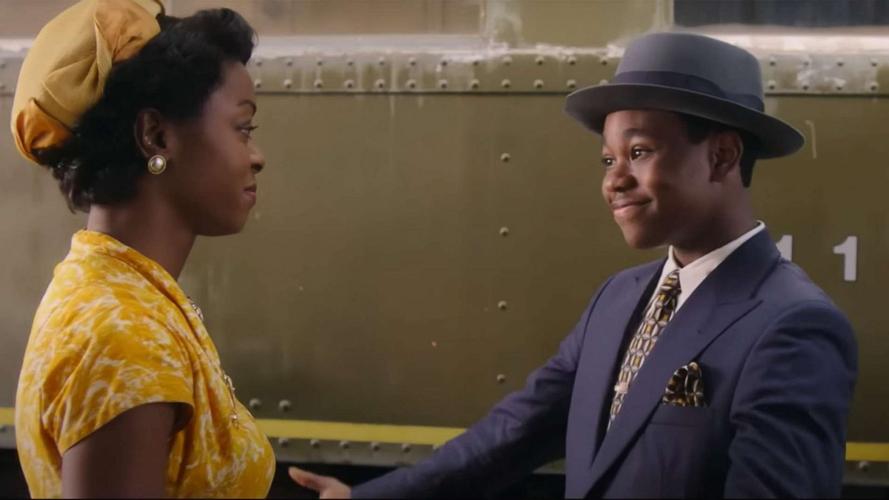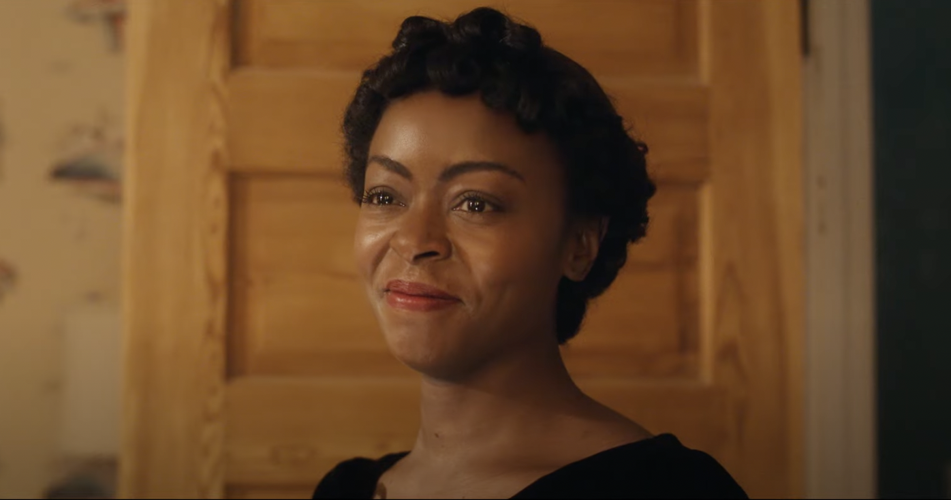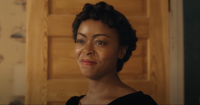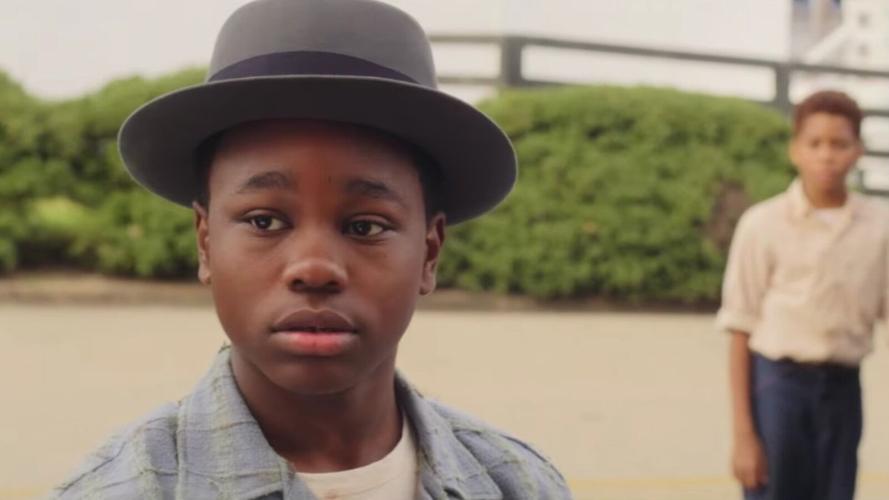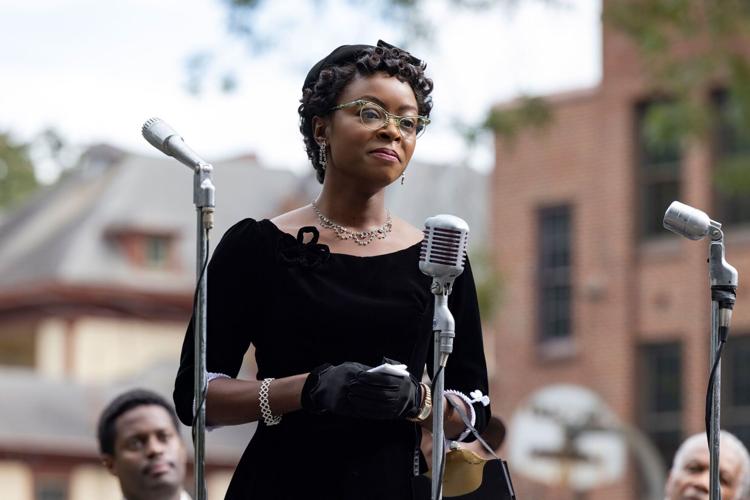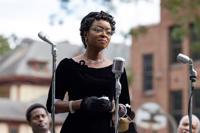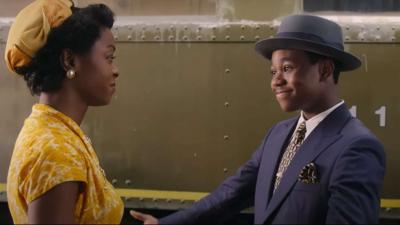The Emmett Till Antilynching Act was signed into law in March 2022 by President Joe Biden. The law was first introduced in 2019. This film went into pre-production the following year. However, the film is based on the decades of investigative work by filmmaker Keith Beauchamp who started researching the Emmett Till case in 1997. Beauchamp's work led to the U.S. Department of Justice reopening the Till case. Director and co-writer Chinonye Chukwu helms this as only her third feature and does a brilliant but tasteful job of retelling what happened to Till in August 1955, as well as the aftermath that would inspire the Civil Rights Movement and the law that bears Till's name.
What's noticeable is the brightness of a lot of the images. It's almost to the point that a lot of the images are blown out or overexposed, as if Chukwu's cinematographer is letting too much light into the lens. Yet, this is likely not an accident but a choice. The subject matter here is so disturbing and so heartbreaking that this entire film could be just one dark tale. Chukwu counters the narrative darkness with some visual lightness. The seemingly overexposed images are almost a counterweight to the narrative's depressing nature. That brightness and contrast help, but it might be hard-pressed for anyone not to drop tears at what unfurls in front of our eyes.

Danielle Deadwyler (The Harder They Fall and Watchmen) stars as Mamie Till, a Black woman living in Chicago, 1955. She's a single mother. She was married twice before. She had her one and only child with her first husband. Despite being a single mother, she had a good job and even had a house and a car. She was successfully raising her son in the city and in the north, away from the Jim Crow South, a racist area that she wanted to avoid. However, her mother, Alma, played by Whoopi Goldberg (Sister Act and Ghost), convinces her to let her son visit the Jim Crow South in order to spend time with family members.
Jalyn Hall (All American and Black-ish) co-stars as Emmett Till, the 14-year-old son of Mamie. He had a stutter due to a bout with polio, but he loves to sing. He's a jokester and enjoys pulling pranks. He likes to laugh and play around. Unfortunately, he's been somewhat insulated from the negative effects of racism. His mother has shielded him. He's not scared of interacting with white people as his other family members, which is why he doesn't share his mother's fears about visiting Mississippi.

There's a little bit of heavy handedness in the beginning of the film. Many may know what happens to Emmett, so the first act of the film is basically anxiety and anticipation as to how Emmett's fate will be depicted. Deadwyler's overly anxious and overly concerned characterization of Mamie might come across as over-the-top, but that first act is good for establishing Emmett as a person and a human, beyond the icon and statistic that most victims under the Black Lives Matter movement don't get. Arguably, Emmett Till is the true origins of the Black Lives Matter movement, which wouldn't begin until 60 years later.
With no on-screen depiction of violence, this film still manages to be one of the most effective horror films of the year. Yes, some will point to Jordan Peele's Nope (2022), Ti West's Pearl (2022) or Parker Finn's Smile (2022), but this film has more effective horror than all of them. There's even a really effective jump-scare that happens in broad daylight that worked very well. Horror films can utilize terror in potent ways. Chukwu's film does the same. That terror is simply racial terror. It's ironic because this film was originally released theatrically on the same weekend as Halloween Ends (2022). For Mamie, her Michael Myers is "Jim Crow" and her haunted house is instead a grocery store where her son's fate was sealed.

The majority of this film though is watching Mamie deal with the grief of losing her son. It becomes one scene after the other of gut-wrenching pain through which Mamie has to walk. Deadwyler's performance is absolutely a knockout in each and everyone of those scenes. She does not leave a dry eye in the house. One particular scene has the camera linger on her face and not cut away, allowing Deadwyler to punch the audience deep into their souls, as a mother speaking about the love of her child. You fall to the ground with her but you also rise to stand up to the challenges ahead of her.
Inaddition to directing an obviously, Oscar-worthy performance, Chukwu also has some great written moments. The theme of how criminal justice is often adjudicated in the media as it is in the courtroom. She also explores the divide between African Americans who lived in the north versus those in the south, which could absolutely be a parallel to current divisions in this country. There's even a theme of how Black parents should raise their children, either with fear or absence of it. It's a question of which is better or is it simply dependent on what color skin one has. It's one of the best of the year.
Rated PG-13 for racism, disturbing images and racial slurs.
Running Time: 2 hrs. and 10 mins.
In theaters.

